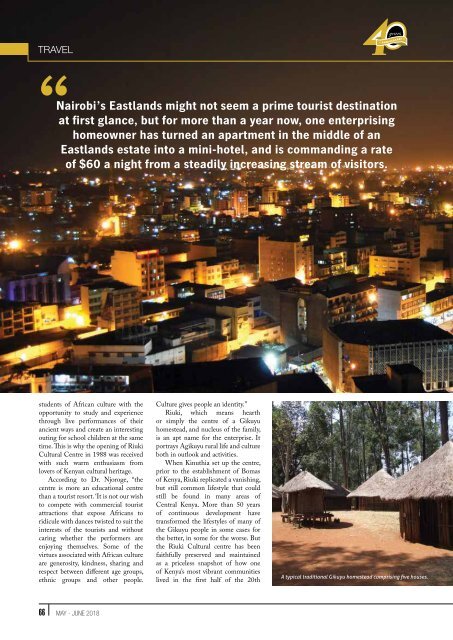May-June-issue
Create successful ePaper yourself
Turn your PDF publications into a flip-book with our unique Google optimized e-Paper software.
TRAVEL<br />
Nairobi’s Eastlands might not seem a prime tourist destination<br />
at first glance, but for more than a year now, one enterprising<br />
homeowner has turned an apartment in the middle of an<br />
Eastlands estate into a mini-hotel, and is commanding a rate<br />
of $60 a night from a steadily increasing stream of visitors.<br />
students of African culture with the<br />
opportunity to study and experience<br />
through live performances of their<br />
ancient ways and create an interesting<br />
outing for school children at the same<br />
time. This is why the opening of Riuki<br />
Cultural Centre in 1988 was received<br />
with such warm enthusiasm from<br />
lovers of Kenyan cultural heritage.<br />
According to Dr. Njoroge, “the<br />
centre is more an educational centre<br />
than a tourist resort. ‘It is not our wish<br />
to compete with commercial tourist<br />
attractions that expose Africans to<br />
ridicule with dances twisted to suit the<br />
interests of the tourists and without<br />
caring whether the performers are<br />
enjoying themselves. Some of the<br />
virtues associated with African culture<br />
are generosity, kindness, sharing and<br />
respect between different age groups,<br />
ethnic groups and other people.<br />
Culture gives people an identity.”<br />
Riuki, which means hearth<br />
or simply the centre of a Gikuyu<br />
homestead, and nucleus of the family,<br />
is an apt name for the enterprise. It<br />
portrays Agikuyu rural life and culture<br />
both in outlook and activities.<br />
When Kinuthia set up the centre,<br />
prior to the establishment of Bomas<br />
of Kenya, Riuki replicated a vanishing,<br />
but still common lifestyle that could<br />
still be found in many areas of<br />
Central Kenya. More than 50 years<br />
of continuous development have<br />
transformed the lifestyles of many of<br />
the Gikuyu people in some cases for<br />
the better, in some for the worse. But<br />
the Riuki Cultural centre has been<br />
faithfully preserved and maintained<br />
as a priceless snapshot of how one<br />
of Kenya’s most vibrant communities<br />
lived in the first half of the 20th<br />
A typical traditional Gikuyu homestead comprising five houses.<br />
66 MAY - JUNE 2018

















